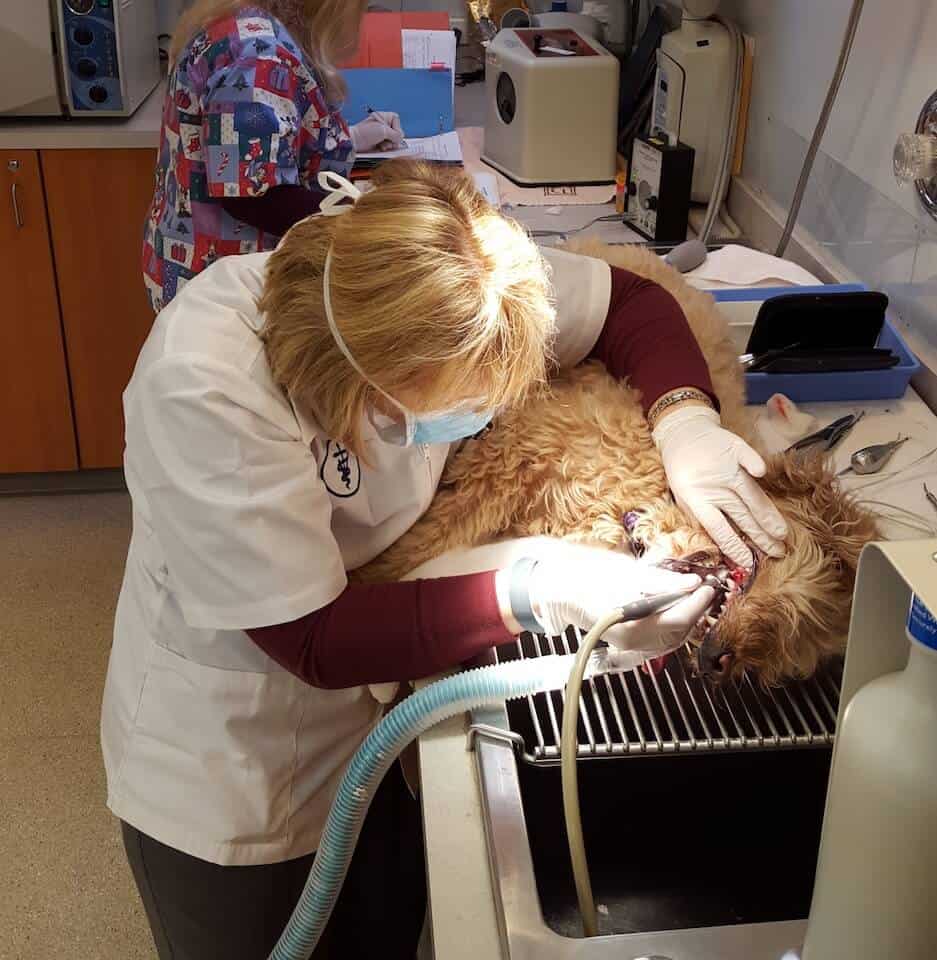Pet Dental Care:
Giving Pets & Owners Something to Smile About

The next time you’re debating whether to share a tasty tidbit with your dog or cat, you may want to consider this: 75% of pets over the age of 3 have dental disease. If left untreated, symptoms such as bad breath and unsightly stains could evolve into something much more serious. That’s why at Becker Animal Hospital, we believe that good dental health is an essential part of your pet’s overall wellness plan.
Genetics and environment each play a role in the health of your pet’s teeth over time. Unlike pet vaccinations, there is no set schedule or rule as to when your dog or cat may need additional dental care. That said, here are some warning signs that could indicate your pet has a problem:
- Bad breath (this is one of the first signs of pet dental disease)
- A yellowish-brown crust of plaque on the teeth near the gum line
- Red/swollen gums
- Pain or bleeding when your pet eats or when his or her mouth or gums are touched
- Decreased appetite or difficulty eating
- Loose or missing teeth
If a pet has any of these symptoms, it could be a sign of periodontal disease. This is a painful inflammatory condition in which bacteria attack the gums, ligaments, and bones that surround and support the teeth. If this condition goes untreated, bacteria from an oral infection could enter the pet’s bloodstream and vital organs, potentially causing life-shortening damage to the pet’s lungs, heart, kidneys, liver, and even the brain. Thankfully, this outcome can be avoided.
Preventive Care
Each time you bring your pet in for a wellness exam, whether it’s a new puppy or kitten, a senior dog or cat, or something in between, our veterinarians will conduct a thorough oral evaluation. Your pet’s mouth will be examined for tarter, plaque build-up, bad breath, lumps, bumps, or anything else that seems out of place.
If everything appears to be okay, our veterinarians may offer advice regarding how to maintain your pet’s good dental condition. This could include reviewing cat or dog teeth cleaning techniques, such as brushing your pet’s teeth (with a specially formulated pet toothpaste), or the use of dental chews that can be beneficial to cat and dog dental health.
Should dental disease be diagnosed, you will be advised regarding the best treatment options available. An important thing to keep in mind is that the earlier a dental issue is treated, the less invasive it will be for the pet. This means less pain for your pet and less expense for you.
Anesthesia-Free Pet Dental Care
We are happy to offer anesthesia-free dental care to dogs and cats. Read more about anesthesia-free dental care.
Therapeutic Dental Cleaning
Our professional pet care staff is highly trained in the latest veterinary dentistry techniques. If your dog or cat requires teeth cleaning, rest assured that he or she will be in good hands.
This procedure will require that your pet be anesthetized. Please visit our veterinary surgery section to learn more about what’s involved and the specific precautions we take to ensure your pet’s well-being.
Once your cat or dog is anesthetized, one of our skilled veterinary technicians will clean and scale the teeth to remove plaque and tarter build-up. After the teeth have been cleaned with the ultrasonic scaler, it’s important to polish them in order to smooth out the microgrooves that result from the scaling. At this point, one of our veterinarians will do a complete oral exam, looking at the teeth, gums, roof of the mouth, and so on, to ensure that everything is healthy. After the procedure, dog owners are provided with a toothbrush and toothpaste to help maintain their pet’s dental health and to distance the time between professional cleanings.
If you would like additional information about pet dental care and the veterinary dentistry services we provide, please contact us!
